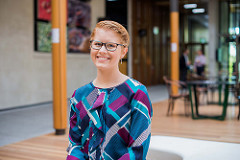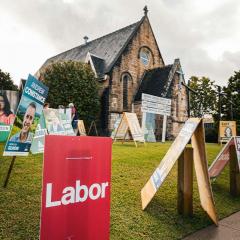The Three Minute Thesis (3MT®) is a global competition that challenges Research Masters and PhD students to describe their research within three minutes to a general audience.
We sat down with the BEL 3MT® winner and People's Choice, Jocelyn Bosse (TC Beirne School of Law) to discuss her love of research, her thesis, and her thoughts on the value of the 3MT® competition.
Jump to: Jocelyn's profile and video
Winner and People’s Choice: Jocelyn Bosse
 Jocelyn Bosse is a current PhD candidate at the TC Beirne School of Law. She graduated with a Bachelor of Laws (Honours)/Bachelor of Science and a Diploma in Languages from The University of Queensland in 2017.
Jocelyn Bosse is a current PhD candidate at the TC Beirne School of Law. She graduated with a Bachelor of Laws (Honours)/Bachelor of Science and a Diploma in Languages from The University of Queensland in 2017.
Drawing on her academic background of plant science and law, Ms Bosse works closely with the School of Law’s ARC Laureate Harnessing Intellectual Property to Build Food Security project team.
Her thesis, Fragmentation of Access and Benefit Sharing Laws for Biodiscovery in Australia: The Case Study of Kakadu Plum (one component of the team’s diverse research activities) aims to address the impacts of the law on Kakadu plum research and development.
As the BEL 3MT® winner, Ms Bosse will compete in the nail-biting UQ 3MT® final at Customs House on 12 September.
Have you always been passionate about research? What was the lightning bolt moment for you, when you realised you wanted to pursue your PhD?
I think deep down yes, I’ve always enjoyed it, but it took a while for me to recognise that it would be something I would pursue as a career. When I started university, I thought I was going to be a commercial lawyer and go into practice. But after I completed some science research electives, I realised that research was something I was passionate about. I loved the intellectual freedom of it and the excitement of doing something different.
Your thesis will address the real-life impact of IP law and other international regulations on Kakadu plum research and development, and whether these regulations are facilitating productive research partnerships and positive outcomes for all. What inspired you to tackle this research area?
Well, at the intersection of plant science and law, this is an area that has been very contentious for a long time. Most people who work in this area are aware of it, so it was always something that I had on the periphery.
Coming into this project and narrowing my focus for my PhD, I realised that this is an area people have written about, but no one has gone out in person to talk to the key players. No one has looked at the actual process and how it affects researchers and Indigenous communities – how different voices are perhaps being amplified or not being amplified – and gained an understanding of what’s happening on the ground.
I was inspired partly out of curiosity, but I also realised that it’s becoming more and more of a practical issue because as new laws and regulations are being developed internationally and domestically, they’re having a substantial effect on Kakadu plum research. It must be addressed soon.
What is new and different about your approach to this research? What are you doing that is unique?
Part of it is just going out and talking to people from various communities and different walks of life to understand all the perspectives on these regulations, and not just looking at one side of the negotiations or one point of view, but really seeing how everyone conceptualises what they’re doing and what they’re hoping to achieve…and perhaps looking at how the law is either helping or hindering them from getting to that point.
What would you say are the key findings from your research thus far?
It’s still early; I completed my PhD confirmation a month ago! I’ve done a lot of literature review and some preliminary interviews, but the bulk of my fieldwork is yet to come.
What is the potential positive impact of your research?
I think that by going out into the field and highlighting what’s actually going on, it will illustrate where the focal points are in these processes that are creating issues, and why it is that so many of these access and benefit sharing agreements, contract negotiations, and projects have run into massive issues so that we can fix these processes. It’s not necessarily just about changing legislation, it may be about changing university policy, or the approaches taken in interacting with Indigenous communities. My research will hopefully determine where those issues are arising so that we can then resolve them or rethink our approach entirely.
What has been the most challenging and the most rewarding aspect of pursuing your thesis so far?
I think the answer to both of those questions is the same: learning about ethnographic methods. It’s not something that I was well versed in when I came into the PhD program; it was a very steep learning curve, but because I‘ve had to learn so quickly it’s been equally rewarding and challenging.
Thankfully, I’ve had some great support from my supervisors. The first six months of my PhD, I joked that my whole brain had to be reconfigured. It can be painful but the growing pains are a good thing.
What’s next for you after you finish your thesis and receive your PhD?
At this stage, hopefully academia. I’m pretty committed to staying in research; I’m enjoying it. I’m also hoping to take on more teaching responsibilities, but research is definitely where the passion is.
What did you enjoy most about the 3MT®, and how did you benefit from it both personally and professionally?
It was interesting to hear about what other PhD candidates are doing, especially because I don’t interact often with people in the Business School. Even people in my own School – I know vaguely what they’re working on but it was fantastic to learn more.
The competition helped me unpack my own research and work out how to communicate what it is that I’m doing in a very short time frame to people who aren’t in my field. Now I have something I can go to as a framework to explain it really quickly – I have my elevator pitch ready!
What would you say to encourage your fellow HDR students to participate in future iterations of the 3MT® competition?
It’s a great opportunity to take stock of what you’re doing as a PhD candidate, because I find that it’s easy to get bogged down in the details and forget about the importance and the implications of your work. You sit down and say ‘actually, I am doing something that’s very useful’, because you’re forced to think about how it affects other people.
Watch Ms Bosse's winning BEL 3MT® presentation:



